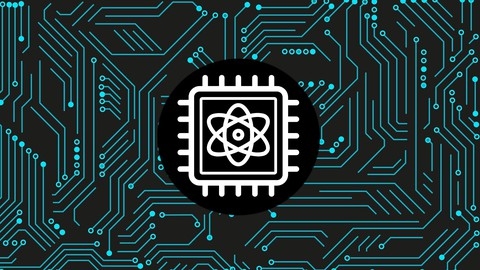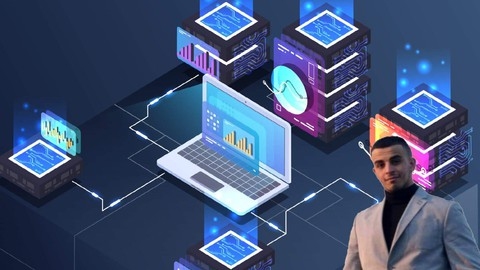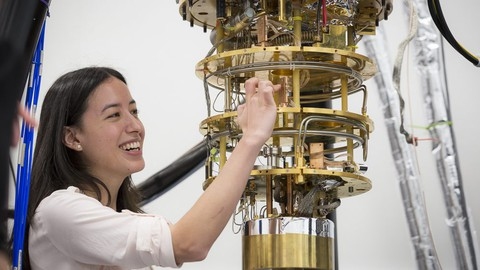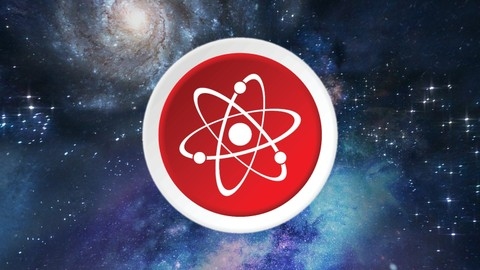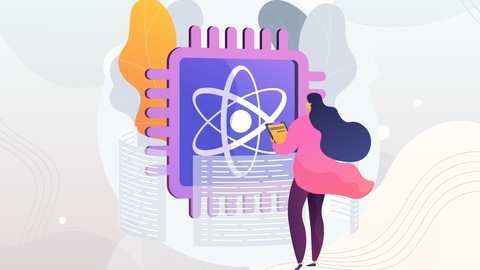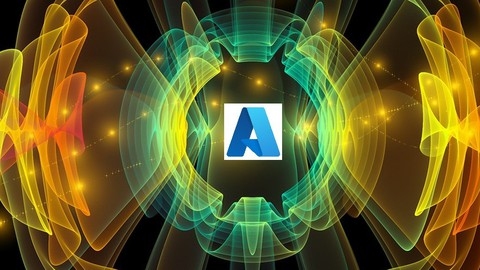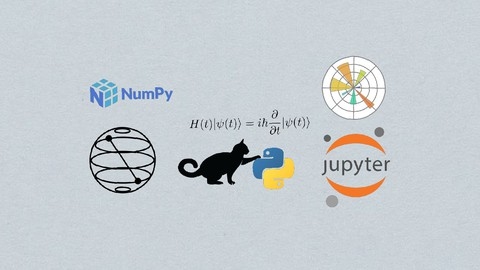Quantum computing is a revolutionary field with the potential to transform various industries by solving complex problems that are intractable for classical computers.
By understanding the principles of quantum mechanics, qubits, and quantum algorithms, you can unlock powerful tools for solving problems in fields like cryptography, drug discovery, and materials science.
Finding a high-quality quantum computing course on Udemy can be a daunting task, with so many options available.
You are looking for a course that’s comprehensive, engaging, and taught by experts, but also fits your learning style and goals.
We’ve reviewed countless courses and, based on our analysis, QC101 Quantum Computing & Intro to Quantum Machine Learning is the best course overall on Udemy.
This comprehensive program covers fundamental concepts, practical applications, and real-world examples, making it an excellent choice for both beginners and those seeking to deepen their understanding of this exciting field.
While QC101 Quantum Computing & Intro to Quantum Machine Learning is our top pick, there are plenty of other great options available.
Whether you’re looking for a course focused on specific quantum algorithms, practical programming skills, or advanced mathematical concepts, we’ve got you covered.
Keep reading to explore our full list of recommendations and find the perfect quantum computing course for your learning journey.
QC101 Quantum Computing & Intro to Quantum Machine Learning
This comprehensive course provides a thorough introduction to the exciting world of quantum computing and its applications in machine learning.
You’ll embark on a journey that starts with fundamental quantum physics concepts and progresses to advanced topics like quantum machine learning.
One of the strengths of the course is its focus on the foundational aspects of quantum computing.
You’ll delve into the fascinating world of photons and their polarization, gaining a deep understanding of how these properties form the basis of quantum computation.
The course also emphasizes the mathematical underpinnings of quantum computing, covering essential topics like complex numbers, linear algebra, and logic.
You’ll then move on to explore the building blocks of quantum computing, including qubits, superposition, and entanglement.
You’ll learn how these concepts enable quantum computers to perform computations that are impossible for classical computers.
The course also provides detailed explanations of different quantum gates and how they are used to construct quantum circuits, which are the foundation of quantum algorithms.
The course’s focus on quantum machine learning is particularly valuable.
You’ll be introduced to important quantum algorithms like KNN and quantum support vector machines, and you’ll gain practical experience using libraries like Qiskit and Q# for developing and executing quantum machine learning models.
Throughout the course, you’ll encounter real-world applications of quantum computing, such as the BB84 protocol for secure communication and Shor’s algorithm for factoring numbers.
This exposure provides valuable context for understanding the potential impact of quantum computing on various industries like finance, medicine, and materials science.
The comprehensive nature of the course, combined with its focus on both theoretical foundations and practical applications, makes it a valuable resource for anyone interested in exploring this rapidly developing field.
The Complete Quantum Computing Course
This comprehensive course offers a compelling introduction to the world of quantum computing.
You’ll embark on a journey from the foundational principles of quantum mechanics to the hands-on experience of building and executing quantum algorithms using Qiskit, IBM’s industry-leading quantum computing software.
The course begins by laying a solid foundation in the mathematical underpinnings of quantum computing, exploring concepts like probability, complex numbers, and matrices.
This ensures you have the tools to grasp the core concepts that follow.
You’ll then dive into the captivating realm of qubits, delving into superposition, entanglement, and the methods for representing their states.
This section truly opens the door to the exciting possibilities of quantum computing.
You’ll learn Python, a highly popular programming language, from the ground up, a crucial step in mastering the tools of quantum computing.
From basic syntax and data structures to libraries and modules, the course equips you to write your own code.
This knowledge then seamlessly transitions into Qiskit, where you’ll create, run, and analyze quantum circuits.
You’ll experiment with fundamental quantum gates like Toffoli, essential building blocks for complex quantum operations.
The course even allows you to execute your quantum circuits on actual quantum computers through IBM’s cloud platform, offering a real-world application of your learning.
The course explores some of the most significant quantum algorithms, including the Bernstein Vazirani algorithm for efficient function evaluations, Deutsch’s algorithm for solving specific problem types, and Grover’s algorithm for dramatically speeding up database searches.
You’ll also encounter the intriguing world of quantum teleportation, where quantum information is transferred without physically moving the qubit, a true highlight of the course.
As you progress, you’ll delve into Shor’s algorithm, renowned for its potential to revolutionize modern cryptography.
You’ll gain practical experience with the Quantum Fourier Transform and Quantum Phase Estimation, crucial elements for advanced quantum algorithms.
The course concludes with an introduction to Aqua, a library for building complex quantum algorithms, and the “Dinner Party” problem, a classic example showcasing the power of quantum algorithms.
This course provides you with a comprehensive understanding of quantum computing, from the core principles to real-world applications.
You’ll master the art of programming quantum computers using Qiskit and implement various quantum algorithms.
Introduction to Quantum Computing
You’ll begin by understanding the core concepts of quantum computing, exploring how it differs from traditional computing and the unique characteristics of quantum systems that make them so powerful.
The course places a strong emphasis on the mathematical foundation of quantum computing, guiding you through the intricacies of complex numbers – essential for grasping the behavior of quantum systems.
You’ll delve into the concept of qubits, the fundamental building blocks of quantum computers, and their crucial differences from the bits used in classical computing.
Next, you’ll be introduced to a range of quantum algorithms designed to tackle problems that are impossible for classical computers to solve.
The course explores different types of quantum algorithms and their applications.
To solidify your understanding, you’ll gain practical experience with Microsoft Q#, a powerful tool for programming quantum computers.
You’ll set up your environment and learn essential operations in Q#, providing you with a hands-on experience of coding for quantum computers.
This course provides a solid foundation in quantum computing, covering both theoretical concepts and practical programming skills.
It’s ideal for individuals interested in exploring the exciting potential of this emerging field.
Beginners guide: Practical Quantum Computing with IBM Qiskit
This course provides a solid foundation in the fundamental concepts of quantum computing, making it an excellent starting point for anyone interested in exploring this fascinating field.
You’ll begin by understanding the difference between classical bits and quantum qubits, and how to create, retain, and read out these qubits using the powerful Qiskit framework.
The course effectively guides you through the core of quantum computing, introducing you to various quantum gates, such as the Pauli X-gate, the Hadamard Gate, and the CNOT gate.
You’ll even have the opportunity to implement these gates on a real IBM quantum computer, providing a practical and engaging learning experience.
Moving beyond the basics, you’ll delve into multi-qubit states and how to represent them through circuits.
You’ll learn to construct circuits using single-qubit gates and explore different scenarios involving the CNOT gate.
You’ll also gain familiarity with other important circuits like the CZ, CY, SWAP, and Toffoli circuits, building a comprehensive understanding of quantum circuit design.
The course doesn’t shy away from practical applications.
You’ll examine the Deutsch-Jozsa (DJ) problem, a classic example showcasing the power of quantum algorithms.
You’ll also learn about quantum cryptography, specifically Quantum Key Distribution, and quantum teleportation, highlighting the potential of quantum computing to revolutionize various fields.
While the course offers a strong foundation, it’s worth noting that it focuses primarily on theoretical concepts and implementation on simulated quantum computers.
If you’re looking for a deep dive into advanced quantum algorithms or real-world applications beyond the introductory level, additional learning resources may be necessary.
QC201 : Advanced Math for Quantum Computing
If you’re looking to delve into the mathematical underpinnings of quantum computing, QC201: Advanced Math for Quantum Computing provides a comprehensive and rigorous foundation.
This course expertly navigates the intricacies of quantum mechanics, building upon your existing mathematical knowledge.
You’ll begin by revisiting core concepts like probability and orthonormality, establishing a solid base for understanding quantum phenomena.
The course then introduces you to the fundamental building blocks of quantum information: qubits.
You’ll explore their properties, including spin and degrees of freedom, and learn how they are represented mathematically using basis vectors and Bloch spheres.
Next, you’ll embark on a deep dive into the intriguing phenomenon of entanglement, where multiple qubits become interconnected.
This section explores the mathematical tools for describing entangled states, including tensor products and change of basis.
You’ll also gain valuable insights into practical applications like cryptography with entanglement, where the unique properties of entanglement are harnessed for secure communication.
Throughout the course, you’ll encounter numerous examples and exercises that reinforce your understanding of multi-qubit measurements and how to manipulate quantum systems using unitary matrices.
Finally, you’ll explore some of the most compelling and mind-bending aspects of quantum computing, including Superdense Coding, Quantum Teleportation, and Bell’s Theorem.
These advanced topics challenge our classical understanding of physics and demonstrate the immense potential of quantum computing for revolutionizing technology.
Quantum Computing with Qiskit Ultimate Masterclass
If you’re seeking a starting point for this complex field, this course provides a solid foundation from the fundamentals of classical computing to advanced algorithms like Shor’s.
You’ll begin by exploring the limitations of classical computing, setting the stage for the power of quantum computing.
You’ll encounter crucial concepts like superposition and entanglement, and learn about the building blocks of quantum computing, including qubits, the Bloch sphere, and various quantum gates.
The course then delves into the mathematical underpinnings of quantum computing, including linear algebra, trigonometry, and complex numbers.
This foundation will be essential for understanding quantum mechanics and manipulating qubits.
The course leverages IBM Qiskit, a powerful open-source framework, to teach you practical skills in building and running quantum circuits.
You’ll even have the opportunity to experiment with simulating quantum teleportation and superdense coding, bringing these concepts to life.
Moving on to quantum algorithms, you’ll learn to implement Deutsch’s, Bernstein-Vazirani, Simon’s, and Grover’s algorithms.
These algorithms demonstrate the potential of quantum computers to tackle problems intractable for their classical counterparts.
You’ll gain a thorough understanding of the quantum Fourier transform and its applications in quantum algorithms, including Shor’s algorithm, which is crucial for breaking modern encryption.
While the course offers a robust foundation in quantum computing, keep in mind that this is an introductory course.
For those seeking more advanced applications or in-depth exploration of specific algorithms, further study will be necessary.
This course provides a strong springboard into the field of quantum computing, equipping you with the knowledge and skills to delve deeper into this rapidly evolving area.
Quantum Computing Fundamentals with Microsoft Azure Quantum
You’ll begin with a solid foundation in the concepts of quantum computing, exploring its history, core principles, and potential applications.
The course then dives into the world of quantum programming, introducing you to the Q# programming language, specifically designed for quantum computing.
You’ll learn how to write your first quantum programs and run them on the Azure Quantum platform, a powerful cloud environment tailored for quantum computing.
The course also delves into quantum-inspired optimization, showcasing how quantum concepts can be leveraged to solve real-world optimization problems.
Quantum Computing in Python using Qiskit
You’ll start by building a strong understanding of complex numbers and their role in representing quantum states, followed by a thorough exploration of linear algebra, a crucial tool for manipulating quantum information.
Get ready to embrace the theoretical minimum of quantum computing, delving into Dirac notation, the essential building blocks of qubits, and the intriguing Bloch sphere, a powerful visual representation of quantum states.
You’ll learn to calculate probabilities, grasp the concept of global phase, and even explore the density matrix, a valuable tool for describing complex quantum systems.
The course then transitions smoothly into the practical world of quantum computing, introducing you to Qiskit, a Python library designed specifically for building and running quantum circuits.
You’ll learn to implement a wide range of single-qubit gates, including the foundational Pauli gates and rotation gates, and explore the techniques for controlling multiple qubits.
Beyond the basics, you’ll venture into exciting topics like quantum communication protocols.
Explore teleportation, superdense coding, and the BB84 protocol, all of which showcase the potential of quantum mechanics to revolutionize communication.
You’ll then delve into powerful quantum algorithms such as the Deutsch-Jozsa and Bernstein-Vazirani algorithms, which demonstrate the potential of quantum computing to solve certain problems far more efficiently than classical computers.
The course culminates with a deep exploration of Shor’s algorithm, a revolutionary algorithm with the potential to break modern encryption methods.
You’ll gain a comprehensive understanding of its inner workings and learn to implement it using Qiskit.
This course provides a well-rounded experience, equipping you with the theoretical foundation and practical skills needed to confidently explore the fascinating world of quantum computing.
Quantum Computing: Theory to Simulation and Programming
You’ll start by understanding the fundamental differences between traditional and quantum computers, exploring the building blocks of these powerful machines, and delving into the intriguing world of quantum physics.
The course emphasizes hands-on learning, guiding you through building your first quantum circuits using real-world tools.
You’ll explore the realm of quantum simulations and learn about powerful algorithms like the Quantum Fourier Transform.
One of the course’s strengths is its practical focus.
You’ll learn how to program a real quantum computer using the Dwave Ocean SDK, applying your newfound knowledge to solve practical problems like traffic analysis and constraint analysis on a Quantum Processing Unit.
You’ll be introduced to Binary Quadratic Models and their application in solving optimization problems.
The course concludes with a glimpse into the cutting-edge field of Quantum Machine Learning, highlighting its potential to revolutionize various industries.
You’ll be equipped with the knowledge and skills to navigate the exciting world of quantum computing.
Quantum Computing and Quantum Machine Learning - Part 2
This course provides a solid introduction to the fundamentals of quantum computing, covering essential concepts like superposition, entanglement, and quantum gates.
You’ll gain a foundational understanding of how these principles form the basis of quantum computation and its potential to solve complex problems beyond the capabilities of classical computers.
The course’s strength lies in its clear explanations of the Bloch sphere, a powerful visualization tool for qubit states.
You’ll also be guided through the practical aspects of quantum programming with IBM’s Qiskit framework, learning how to set up your environment and create your own quantum programs.
The opportunity to gain hands-on experience with real quantum computers through IBM QX is a valuable addition.
While the course provides a good foundation, you may find that it could benefit from more in-depth discussions on certain topics.
For instance, the exploration of quantum algorithms and their applications could be expanded for a more comprehensive understanding of their potential.
Also check our posts on:


